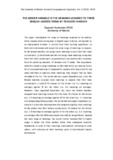| dc.description.abstract | This paper investigated the range of meanings assigned to the address terms madam, boss and my dear in English usage in Kenya, with gender as an independent variable. It started from three working hypotheses: a) both men and women will assign the same range of meanings to madam, b) the female teachers will assign more meanings to boss than their male counterparts, c) the female teachers will assign more meanings to my dear than their male counterparts. A questionnaire was used to elicit responses from 30 practising teachers: 15 females and 15 males. The respondents were first asked to assign meanings to the three terms by choosing from a list of proposed meanings (9 proposed for madam, 6 for boss and 6 for my dear) and then to add any other meanings they thought had not been included in the list. The results did not support hypothesis (a), since the female teachers assigned more meanings to madam than their male counterparts: a total of 93 choices for the former (i.e. 6.2 meanings on average) against 78 for the latter (i.e. 5.2 meanings on average). However, they supported hypothesis (b), since the female teachers assigned more meanings to boss than the male: 58 choices for the former (i.e. 3.9 meanings on average) against 47 for the latter (i.e. 3.1 meanings on average).Regarding my dear, the results did not support hypothesis (c), since it is in fact the male teachers who assigned (slightly) more meanings to the phrase than their female counterparts: 53 choices for the former (i.e. 3.5 meanings on average) against 51 for the latter (i.e. 3.4. meanings on average). But this difference seems too small to be significant. Beyond the mere range of meanings, the results further revealed that in English usage in Kenya the three address terms have undergone semantic broadening in some of their meanings and semantic narrowing in some others, with reference to their meanings given in international English dictionaries. | en_US |



